One question frequently dominates the use of AI in education: Could artificial intelligence replace teachers?
So far, it is clear that many schools are embracing the use of AI to enhance learning, but the fears that AI could take over have not been proven.
Chan and Tsi, at the University of Hong Kong, published a paper asking questions about this topic.
In this article, let’s consider some of their main findings.
Enhancing, Not Replacing, Teachers in Higher Education
AI is becoming integral to teaching, offering personalised learning, instant feedback, and administrative support. Intelligent learning programs and virtual teachers can provide one-to-one learning opportunities, manage administrative-style tasks, and deliver instant feedback.
There’s a surge of software from various companies, presenting a mix of impressive tools alongside redundant or unnecessary offerings. It can be hard to ascertain which tools will positively impact the classroom.
Despite these advancements, AI cannot reproduce the critical thinking, ingenuity, and emotional intelligence that human teachers bring. This unique human touch is essential for adaptive teaching, supporting social-emotional development, and addressing cultural nuances, ensuring teachers remain indispensable.
Understanding AI’s Limitations and Benefits in Education
Grasping AI’s limitations and benefits is crucial in the education sector. While AI can boost efficiency and support learning, it lacks the emotional intelligence essential for holistic student development.
AI can handle routine tasks, allowing teachers to concentrate on specialised responsibilities such as developing the curriculum and giving individual support to pupils. However, AI’s inability to provide emotional assistance, build confidence, and engage in meaningful interactions highlights the unique role of real-life teachers.
As AI becomes more common, educators must adapt and discover for themselves how to use these technologies effectively to ensure students receive a comprehensive education.
Examples of Effective AI Use in Education
- Teachers should leverage AI to manage routine tasks and deliver personalised feedback, thus freeing up time for more intricate teaching responsibilities.
- AI can assist with lesson planning, content summarisation, and creating engaging scenarios for students.
- AI can enhance students’ writing and research abilities by providing structure, clarity, and logical organisation in their work.
The Future of Education: A Harmonious Blend of AI and Human Insight
As we look to the future, integrating AI in education represents an exciting frontier. The key lies in striking a balance where AI handles the mechanical aspects of teaching, allowing educators to focus on the human elements that machines can’t replicate.
By embracing AI, teachers can become more effective and efficient, ultimately providing a richer, more comprehensive educational experience that prepares students not only to navigate but to thrive in an AI-enhanced world. This harmonious blend of AI and human insight is the future of education, promising to cultivate well-rounded individuals equipped for the challenges ahead.
Ignoring AI means failing to prepare students for an AI-driven future, where proficiency in using AI technologies and understanding their implications is crucial. By recognising AI’s current strengths and limitations, teachers can refine their teaching strategies, focusing on nurturing students’ critical thinking, creativity, and emotional intelligence.



